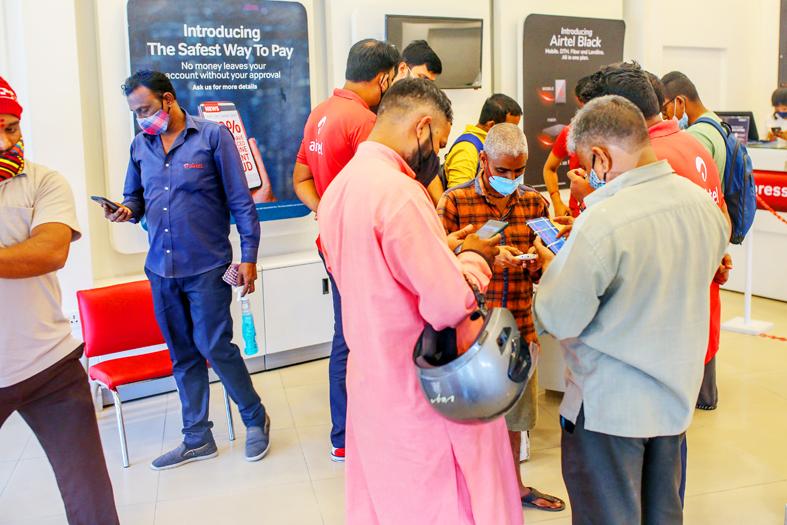Three of China’s largest smartphone brands have opened discussions with Indian manufacturers about making phones locally for global export, a concrete step toward establishing the country as a hub for electronics production.
Xiaomi Corp (小米), Oppo Mobile Telecommunications Corp (歐珀) and Vivo Communication Technology Co (維沃) are holding talks with Indian contract phonemakers, hoping to take advantage of cash incentives readily available to local firms, people familiar with the matter said.
If they go ahead, the plan is to get Lava International Ltd and Dixon Technologies India Ltd to assemble the phones and begin exporting from their plants as early as this year, they said, declining to be quoted on sensitive negotiations.

Photo: Dhiraj Singh, Bloomberg
Such a collaboration would be a milestone for an industry increasingly dominated by Chinese brands.
China is the world’s largest consumer and producer of smartphones, but Xiaomi and its peers are looking to expand globally as their home market plateaus.
Oppo and Vivo have begun discussions with Lava, while Xiaomi is courting Dixon, the people said.
Both groups are eyeing Indian government cash incentives linked to production capacity, a program intended to make India more competitive as an electronics maker.
Chinese executives are expected to begin visiting Lava and Dixon factories as soon as COVID-19 travel restrictions are lifted, one of the people said.
The Indian government has long pressed overseas brands to boost exports in return for access to India, the world’s fastest-growing smartphone market.
More broadly, manufacturers globally are exploring ways to reduce their reliance on a China-centric supply chain following a trade dispute with the US and shipping constraints amid the COVID-19 pandemic.
India, along with Southeast Asia, is emerging as an alternative.
“India is making the most of the technology cold war between the US and China, and now China and Taiwan, to strategically increase electronics manufacturing,” said Priya Joseph, a policy analyst at researcher Counterpoint. “After getting phonemakers to make in India for the domestic market, the government is preparing the ground for the next level of battle in phone exports.”
India’s mobile exports have skyrocketed since New Delhi introduced the Production-Linked Incentive program in 2020.
Mobile exports are expected to surpass 450 billion rupees (US$5.9 billion) in the year ending this month, a 30-fold jump in five years, the India Cellular & Electronics Association said.
“We foresee another 10-fold growth by 2026 riding on the key pillars of Apple [Inc] and Samsung [Electronics Co]’s global value chain ecosystem, as well as large domestic companies such as Lava,” association chairman Pankaj Mohindroo said. “India will hit about [US]$60 billion in exports by 2026.”
Several major names have signed up for the government incentives program since it was unveiled in the middle of 2020, envisioned at the time as helping create US$150 billion in mobile phone production over five to six years.
Apple’s primary suppliers, Hon Hai Precision Industry Co (鴻海精密), Wistron Corp (緯創) and Pegatron Corp (和碩), were among the first to commit, alongside Lava and Dixon.
Since then, the government has extended similar incentive plans to electronics from laptops to semiconductors.
Xiaomi, Oppo and Vivo have begun shifting capacity to India. That has helped the country emerge as the second-largest manufacturer and assembler of mobile handsets by volume.
A couple of hundred factories now manufacture basic feature phones as well as smartphones, up from just two in 2014, said Amitabh Kant, chief executive officer of government think tank Niti Aayog.

South Korea’s equity benchmark yesterday crossed a new milestone just a month after surpassing the once-unthinkable 5,000 mark as surging global memory demand powers the country’s biggest chipmakers. The KOSPI advanced as much as 2.6 percent to a record 6,123, with Samsung Electronics Co and SK Hynix Inc each gaining more than 2 percent. With the benchmark now up 45 percent this year, South Korea’s stock market capitalization has also moved past France’s, following last month’s overtaking of Germany’s. Long overlooked by foreign funds, despite being undervalued, South Korean stocks have now emerged as clear winners in the global market. The so-called “artificial intelligence

‘SEISMIC SHIFT’: The researcher forecast there would be about 1.1 billion mobile shipments this year, down from 1.26 billion the prior year and erasing years of gains The global smartphone market is expected to contract 12.9 percent this year due to the unprecedented memorychip shortage, marking “a crisis like no other,” researcher International Data Corp (IDC) said. The new forecast, a dramatic revision down from earlier estimates, gives the latest accounting of the ongoing memory crunch that is affecting every corner of the electronics industry. The demand for advanced memory to power artificial intelligence (AI) tasks has drained global supply until well into next year and jeopardizes the business model of many smartphone makers. IDC forecast about 1.1 billion mobile shipments this year, down from 1.26 billion the prior

People stand in a Pokemon store in Tokyo on Thursday. One of the world highest-grossing franchises is celebrated its 30th anniversary yesterday.

Chinese artificial intelligence (AI) start-up DeepSeek’s (深度求索) latest AI model, set to be released as soon as next week, was trained on Nvidia Corp’s most advanced AI chip, the Blackwell, a senior official of US President Donald Trump’s administration said on Monday, in what could represent a violation of US export controls. The US believes DeepSeek will remove the technical indicators that might reveal its use of American AI chips, the official said, adding that the Blackwells are likely clustered at its data center in Inner Mongolia, an autonomous region of China. The person declined to say how the US government received